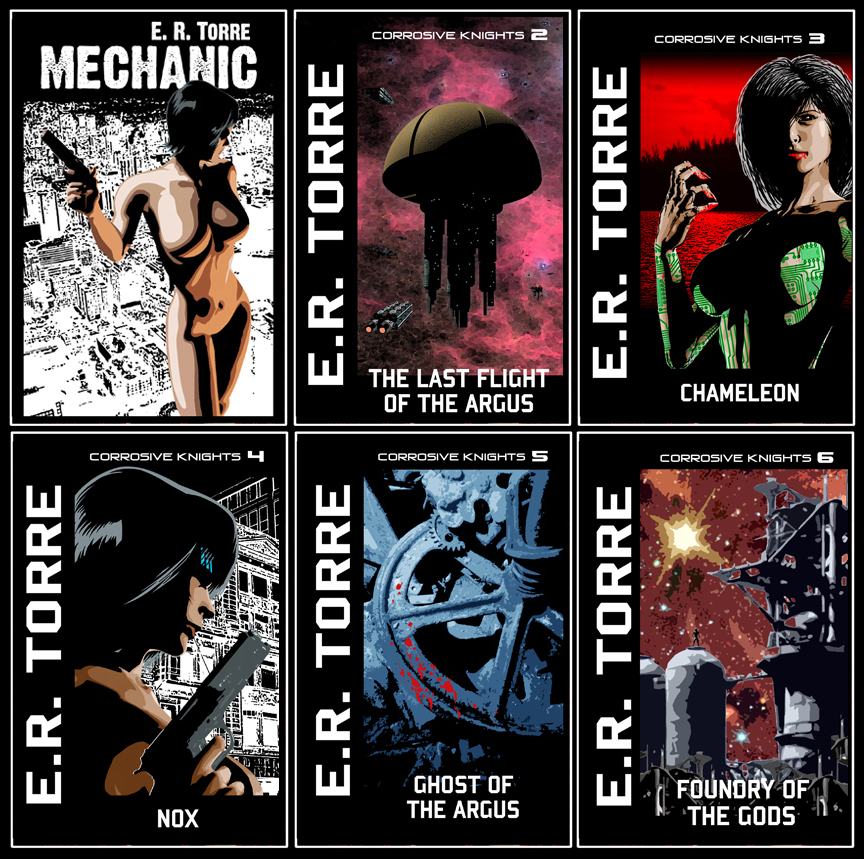Yesterday was a particularly good day for my work on the latest Corrosive Knights novel (this will be book #7 and will conclude the main story I’ve been working on for nearly a decade now).
Why was it a particularly good day? Because as I was thinking the novel’s plot over (something I tend to do with my latest works all hours of the day), the synapses in my brain figured out a way to bring various elements of the beginning and end of the novel together and in a matter of a half-hour and while on the computer I created a beautiful, exciting outline of the bridge linking the two ends of the book.
Mind you, I came up with some far rougher general ideas as to what was going to happen in the middle of the book before but those thoughts were far less complete than what I came up with yesterday. Indeed, yesterday I filled almost all of the gaps of that middle section of the novel and this will obviously be a tremendous help.
I’ve written about this before but it bears repeating: Authors, like all working people, have their strengths and weaknesses and likes and dislikes. I’ve heard of authors who have a tough time “beginning” a novel. I’ve heard of authors who have difficulties wrapping things up. Indeed, one of the greatest complaints I’ve read against Stephen King’s work (I only wish I could write as much as he does!) is that his novel endings tend to be weak.
For me personally, starting and ending a novel hasn’t, to date, been all that much of a problem. In fact, whenever I start a new novel I tend to have strong opening and closing ideas.
Where my problem lies is in providing the tissue connecting those two elements. Further frustrating me is the fact that I strive to make my novels as original as I can and want readers to be surprised by the twists and turns leading to my novels’ endings yet everything must come together by that ending.
Trust me, that’s not an easy task!
Throughout my life I’ve sought out interviews with noted authors about what motivates them and how they work. Some authors revel in what I consider a “mythological” take on their writing. To them, writing may be described as akin to creating “magic.” I’ve read more than one author talk about how their fictional characters take charge of the story and dictate its direction, as if this fictional character the author’s created has taken hold of the story being told.
I think a lot of that is bunk.
I know I’ve said it before but writing is, first and foremost, work. Plain and simply. In my case this work can be very hard and mentally exhausting.
On TV, shows like Murder She Wrote and Castle present a fiction of an author who seems to do their writing in their spare time, creating their “best sellers” in a matter of a few hours while otherwise living a fabulous, carefree life.
The reality, at least for me, is one of almost obsessive mental concentration. Though you may not believe it, I do indeed spend almost every waking hour thinking of my latest novel/story. I don’t think a minute passes where some part of my brain isn’t obsessing over some detail, big or small, within my latest work.
The thing is, while I tend to get the opening and closing acts of my works out of the way pretty quickly, that middle connective section requires a great deal of care and thought and, to date, I’ve yet to have a middle section of my book come to me as “easily” as my novel openings/closings.
Regardless of all the work involved, I freaking love creating stories. As difficult and as frustrating and as time consuming and as un-sexy as the act of creation may be, when all that hard work is done and I hold in my hands my latest novel and then add it to the stack of novels I’ve already written, I’m in heaven. It is as pure a moment of pride and unadulterated joy as I can have.
And I can’t wait to get to work on the next one.

